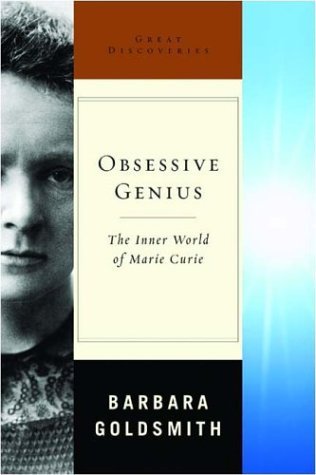

 |

|

The average rating for Obsessive genius based on 2 reviews is 4 stars.
Review # 1 was written on 2014-04-23 00:00:00 Iga Muradyan Iga MuradyanI finished this and thought it was very good, maybe quite simply because Marie Curie had such an interesting life, rather than the author's writing skills. Fascinating and moving. Science details are explained just enough so you understand.....at least most of the time. Sometimes books go on and on and you drown in the details, but not here. You learn about her childhood, her devotion to science, her love for her children and husband and science. I repeated science twice, and that was done on purpose. I want to keep this short, but you also get relevant details on WW1 and Polish history too. Marie Curie had an interesting life. As a person she is someone to admire, but neither are her failures shied from. I do recommend the book. Fine narration of the audiobook by Eliza Foss. Maybe I should also listen to The Half-Life of Marie Curie! |
Review # 2 was written on 2016-12-31 00:00:00 Richard Upchurch Richard UpchurchThere have been so many biographies about Marie Curie (Marya Salomea Sklodowska 1867-1934) that any new book is going to either present new material or look at the information from a different viewpoint. Goldsmith, a social historian, has chosen to pursue "the real woman". Curie was one of only two women to graduate from the Sorbonne with a science degree. Curie was born in Russian occupied Poland and the University of Warsaw did not allow women to attend. She married Pierre Curie and shortened her name. Goldsmith covers primarily the hatred, bigotry and prejudice Curie had to overcome rather than on her scientific discoveries. Goldsmith's weakness is her difficulty in attempting to explain the scientific and theoretical aspects of Marie Curie's work. Instead Goldsmith tells how the scientific establishment detested her. She won the Nobel Prize in 1903 for Physics. She shared this with her husband Pierre for discovering radioactivity. She was not allowed to give the keynote lecture that the winner traditionally gives because she was a woman. In 1911 Curie, now a widow, won a second Nobel Prize this time in Chemistry for the discovery of Radium. She won this one alone. Curie, a winner of two Nobel Prizes, was refused membership in the French Academy of Science because she was a woman. During WWI, she designed a mobile x-ray machine and then trained her daughter in its use. Her daughter then trained technicians to use it. In 1934 her daughter, Irene, discovered artificial radioactivity and won the Nobel Prize. Marie Curie discovered polonium, radium and radioactivity. She died on 3 July 1934 of aplastic pernicious anemia caused by radium radiation. The book was well written and researched. The weakness is noted above. The book was interesting, but there are more in-depth biographies about Marie Curie available. Eliza Foss does a good job narrating the book. Foss is a stage actor and award winning audiobook narrator. I have listened to numerous books she has narrated. |
CAN'T FIND WHAT YOU'RE LOOKING FOR? CLICK HERE!!!